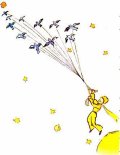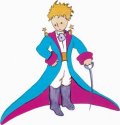|
|
J’ai ainsi vécu seul, sans personne avec qui parler véritablement, jusqu’à une panne dans le désert du Sahara, il y a six ans. Quelque chose s’était cassé dans mon moteur. Et comme je n’avais avec moi ni mécanicien, ni passagers, je me préparai à essayer de réussir, tout seul, une réparation difficile. C’était pour moi une question de vie ou de mort. J’avais à peine de l’eau à boire pour huit jours. Le premier soir je me suis donc endormi sur le sable à mille milles de toute terre habitée. J’étais bien plus isolé qu’un naufragé sur un radeau au milieu de l’océan. Alors vous imaginez ma surprise, au lever du jour, quand une drôle de petite voix m’a réveillé. Elle disait : « S’il vous plaît… dessine-moi un mouton ! — Hein ! — Dessine-moi un mouton… » J’ai sauté sur mes pieds comme si j’avais été frappé par la foudre. J’ai bien frotté mes yeux. J’ai bien regardé. Et j’ai vu un petit bonhomme tout à fait extraordinaire qui me considérait gravement. |
|
|
Antoine de Saint-Exupéry (1900-1944) was an aviator, a pioneer of air-mail in the 1930s. Then he joined the French Air Force during World War II. He disappeared in July 1944 in the Mediteranean during a reconnaissance flight. He wrote famous books such as Terre des hommes (1931) or Vol de Nuit (1939). They’re all inspired by his aviation experiences and adventures even if they’re not autobiographical. Saint-Exupéry most famous book is Le Petit Prince (1943), a poetic and self-illustrated tale which was an enormous success and has been translated in many many languages. 
|
|
|
Le Petit Prince tells the story of an adult narrator, an aviator who crashes in the Sahara desert and meets a blond young boy, le petit prince, who comes from another planet. They spend a week together in the desert. The prince describes his planet, the B-612 asteroid on which there are only three volcanoes and a rose. He tells the narrator his story : the reason why he left his planet, the different encounteers he made during his journey and on Earth. And what he learnt. Saint-Exupéry took care of the illustrations himself with watercolors that are today as famous as the text itself.  Le Petit Prince is a poetic and philosophic tale. It looks like a children’s book and every French children read it but only adults can unterstand it right as it contains a real reflexion about life and human nature. That’s why this book is also studied a lot in schools and even in universities. The text we propose you today is at the beginning of the book. It’s the very moment of the encounteer between the aviator and the prince. The entire book is available here |
|
|
Vécu is the past participle of the verb vivre (to live). It’s a very useful word to know. When you
want to conjugate the verb vivre at the passé composé, you say :
J’ai vécu — tu as vécu — il a vécu nous avons vécu — vous avez vécu — ils ont vécu. |
|
|
Véritablement : really, actually. Panne (fém.) : breakdown. Moteur (masc.) : engine. Mécanicien (masc.) : engineer. Passager (masc.) : passenger, rider. Réparation (fém.) : repairing. Question (fém.) de vie ou de mort : matter of life and death. Mille (masc.) : mile. Isolé : isolated, remote, lonely. Naufragé (masc.) : survivor of a shipwreck, castaway. Radeau (masc.) : raft. Lever (masc.) du jour : daybreak, sunrise. Dessiner : to draw. Hein : huh, what, sorry. Sauter sur ses pieds : to jump to one’s feet. Foudre (fém.) : lightning. Frappé par la foudre : struck by lightning. Frotter ses yeux : to rub one’s eyes. Petit bonhomme (masc.) : little boy. Considérer : to look at. Gravement : gravely, solemnly. |

